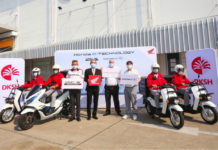Smartphone penetration set to spark IT spending increase
The Thailand arm of the premier global market intelligence company International Data Corporation (IDC) believes Information Technology (IT) spending in the country will grow by about 10.6 percent during 2015.
IDC Thailand country manager Michael Araneta was quoted as saying, “We believe businesses will invest in IT mainly to increase revenue rather than save costs.”
If IDC’s predictions are correct, then Thailand’s IT spending is set to reach about 402 billion baht over the next year, helped by economic growth and especially by the rapidly expanding mobile and cloud computing technologies.
IDC considers the four areas of growth within the IT realm are mobile computing, cloud computing, big data, and social networking. These four areas are classified as the third computing platform and IDC has said this has the potential to transform many industries across the world.
The expected strong growth for 2015 will make up for the sluggish five percent growth experienced in 2014, the lowest rate of expansion since 2011. Of course, the relatively poor economy and the political turmoil of the first five months of 2014 took their toll on the final numbers.
Perhaps not surprisingly, most IT spending will be driven by the purchase of mobile devices, such as smartphones, says Mr Araneta. As well, IT professional services and cloud, software and data storage will be the other key drivers.
The three biggest spenders in the IT area will be the usual suspects of banks, telecoms, and manufacturers.
Smartphones are expected to really lead the IT charge throughout 2015, with IDC expecting a 17 percent growth with 19.2 million out of 30 million total mobile handsets. In 2014, smartphone sales amounted to around 16.5 million, up from 13 million units in 2013.
IDC is of the opinion that smartphone sales will mean half the mobile users in Thailand will have one, an increase over the current level of 37.7 percent.
Concomitant with the take-up in smartphones, IDC believes the popularity of social media will lead to unprecedented data consumpti.on levels
The biggest losers over the last year have been desktop computers and notebooks with a 17 percent decline in sales to 2.48 million units in 2014. Nonetheless, this sector is expected to regain some ground during 2015 with projected sales of 2.66 million units.
Sales of tablets, outside of government-sponsored programs, are expected to rise by about five percent in 2015 to around 2.6 million units.
Nonetheless, given the size of the smartphone market, it is clear the IT revolution has moved very definitely into the physically mobile rather than physically static arena.
The biggest hurdle for smartphone and other mobile technologies to overcome happens to be in the area of mobile data and application security. In this area Thai companies still lag behind other countries and it is an issue which needs to be addressed sooner rather than later.
Thai banks are at the forefront within Asean in adopting cloud computing technology for their customer relationship management.
Telecoms spending within Thailand is another area where spending is expected to continue upwards, with a projected increase of 14 percent to about US$11.1 billion during 2015. This would follow a 13 percent jump in 2014.
Telecoms are expected to expand strongly in the fixed-line and wireless broadband networks over the next 12 months or so.










